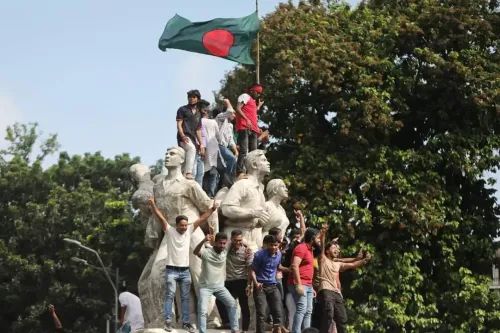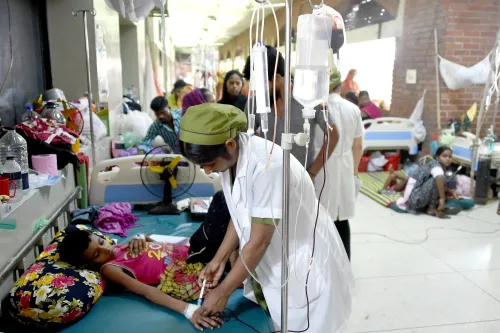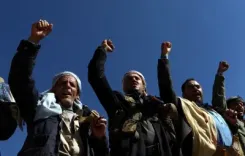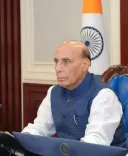Are Internal Fault Lines in Pakistan Sharper Under Army Chief Munir?

Synopsis
Key Takeaways
- Economic instability is a pressing issue in Pakistan.
- The military's influence on civilian governance is growing.
- Human rights abuses are on the rise amid military operations.
- Protests are widespread due to economic hardship.
- Future outlook for Pakistan remains bleak without reform.
Islamabad, Nov 7 (NationPress) The various internal fault lines such as economic instability, political deterioration, and escalating violence have become increasingly apparent under the leadership of Pakistan's Army Chief, Field Marshal Asim Munir. Throughout his term, military influence has surged across all dimensions of Pakistan's national framework, including foreign relations, resource allocation, and the private sector, according to a report.
The military often portrays itself as the protector of Pakistan; however, this overextension is undermining civilian institutions, crippling the economy, and leaving countless citizens trapped in a cycle of poverty and oppression, as highlighted by a report from Greek City Times. The most pressing concern is economic, with government surveys and IMF evaluations indicating a projected GDP growth of merely 2.7% for the fiscal year 2024-25—insufficient to keep pace with population growth and well below the 5% necessary for job creation and sustainable development.
The World Bank has cautioned that Pakistan's growth trajectory remains fragile and uneven, with rising rates of unemployment and underemployment. Although the government claims that Munir's economic revival strategy, which is centered around the military-controlled Special Investment Facilitation Council (SIFC), will draw foreign investors, the SIFC's performance after one year has been lackluster.
The Greek City Times report articulated: "Pakistan is currently experiencing one of the most fractured periods in its history. The persistent internal fault lines—economic weakness, political disarray, and violent instability—have become more pronounced under Field Marshal Syed Asim Munir. His leadership has intensified military engagement across various sectors of Pakistan’s national landscape, spanning foreign policy, development, resource management, and the private economy."
Visible failures also plague the security landscape, with the Pakistani army's counter-insurgency strategies faltering as new militant factions exploit public discontent. The Tehreek-e-Taliban (TTP) has ramped up assaults on security personnel, particularly in Balochistan and Khyber Pakhtunkhwa, according to the report. In retaliation, Pakistani forces have launched operations that have displaced thousands of families. Human rights organizations report widespread violations, including extrajudicial killings, enforced disappearances, and targeting of individuals under the guise of anti-terrorism initiatives.
The situation in Balochistan is alarming, with families of missing individuals holding protests in Quetta and Islamabad. The Pakistan Human Rights Commission and international bodies like Amnesty International have repeatedly urged the government to address enforced disappearances and investigate military abuses; however, state-sponsored repression has intensified. The Pashtun region in Khyber Pakhtunkhwa is experiencing a similar crisis.
In Pakistan, civilian authority has eroded, with political parties functioning under military oversight, parliament serving merely to endorse military directives, and the judiciary operating within constraints imposed by intelligence agencies, as the report indicates. Media outlets face significant censorship, with journalists being arrested or silenced through intimidation. Grassroots protests have emerged over electricity shortages, rising wheat prices, and unemployment in major cities. Farmers in Punjab and Sindh have blocked roads in protest against shortages of fertilizers and diesel, as well as persistent power outages. Instead of engaging in constructive dialogue, authorities respond with arrests and violent suppression.
The Greek City Times report concluded: "Pakistan’s internal fractures are now glaringly obvious. Economically, the nation is in dire straits; politically, it is hollow; socially, it is restless. The military’s fixation on power has stifled reform and extinguished hope. International donors and financial institutions continue to provide temporary relief, but none can remedy a system where the military has become both the policymaker and the profiteer. The reality of dependency, repression, and failure has overshadowed the promise of development. Consequently, Pakistan’s future appears bleak. As long as the military prioritizes control over competence, economic stagnation, persistent violence, and citizen suffering will continue. Non-state actors will gain strength as public trust in the state diminishes, leading to deepening ethnic resentment and local insurrections. As the generals maintain their rule through fear and violence, Pakistan risks descending into a state of perpetual crisis. The internal fault lines exacerbated by Asim Munir’s leadership are now threatening to tear the nation apart from within."









